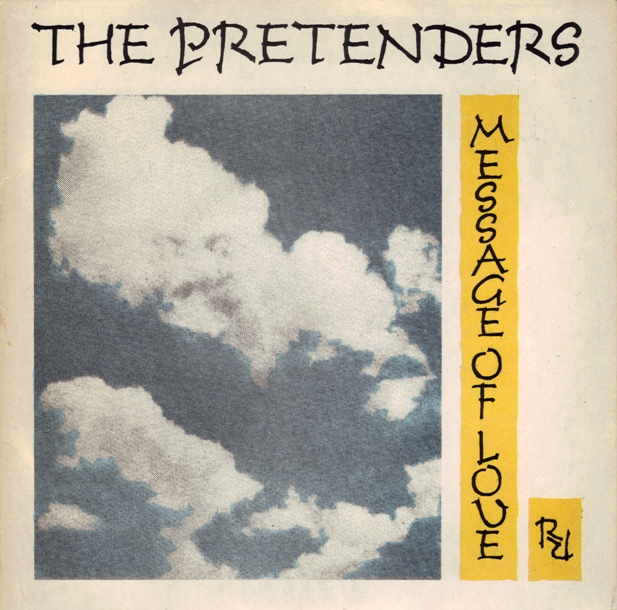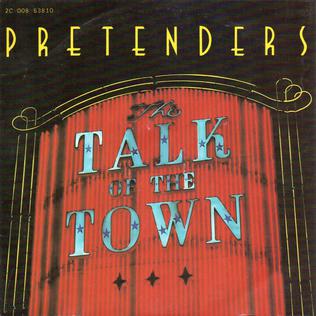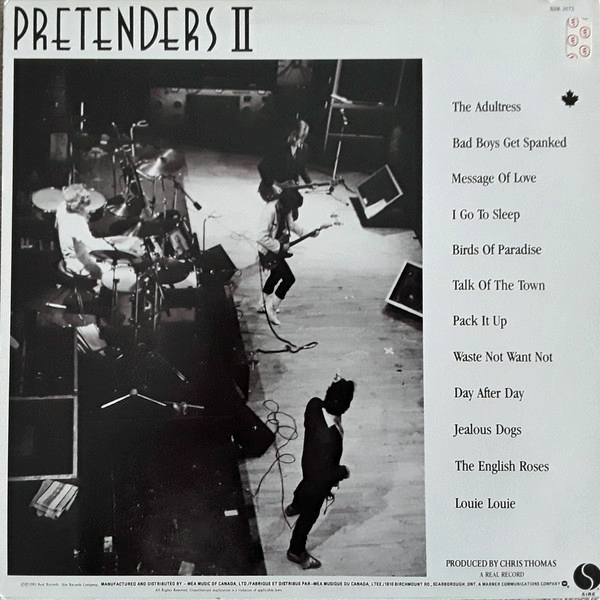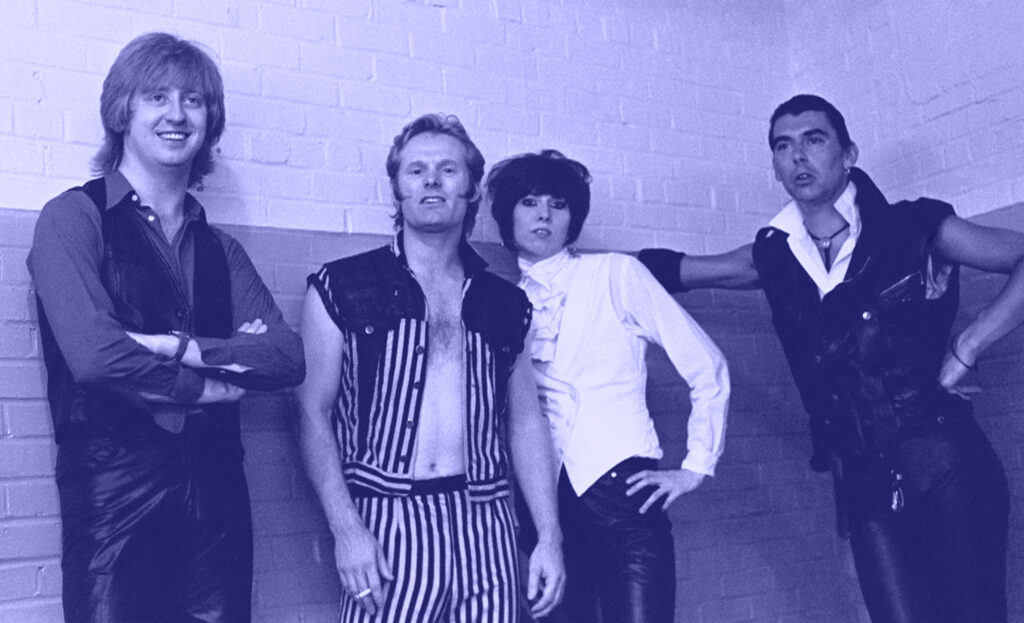
Many bands suffer from the “Sophomore Slump” after having a successful debut. It’s common because while you often have years to write, revise, and road test songs that end up on the first record, the hustle to do a follow up without the luxury of being able to revise and road test the new tunes can lead to something less-than-stellar. It can be a humbling experience, or it can break a band. For The Pretenders, it seemed like it was neither when Pretenders II came out in 1981– but it certainly ended up breaking the band about a year later.
From the band’s formation in 1978 to the debut of their self-titled album in 1980, The Pretenders had time to both refine their sound with the addition of James Honeyman-Scott on guitar and (then boyfriend) Pete Farndon on bass. Drummer Martin Chambers didn’t join the group until the band’s original drummer, Gerry Mcilduff, was replaced after releasing “Stop Your Sobbing” in 1979. Lead singer-songwriter and rhythm guitar player Chrissie Hynde’s songs captured a kind of punk, sexually liberated, and sometimes feminist view that was lacking in the new wave of rock music at the time. Oh, and it didn’t hurt that The Pretenders’ sound — while rooted in rock — spanned the range of rock, post-punk, and pop in 12 tightly written songs. Coming out of the proverbial gate with such a strong debut — plus the rigors of touring — meant there was very little time to write songs for their follow-up. Drummer Martin Chambers noted as much in 1983 with Trouser Press magazine: “Our first LP was very special. The second album was more difficult because Chrissie had no time to write. She has to be relaxed to write, and we were on the road all the time.” Even with all that pressure on Hynde to write a hit follow-up, Chamber noted, “I’m quite happy with it (Pretenders II). I listen to the first and second albums with equal enjoyment.” The band certainly changed by 1981. They not only had a successful debut, but they released an EP with two great songs (“Message of Love” and “Talk of the Town”) in March of ‘81 that also included two outtakes from the first record (“Cuban Slide” and “Porcelain”) and a blistering live version of “Precious.” The EP (titled Extended Play) seemed to be a teaser for all the great things to come in the second full album. Alas, Pretenders II at times succumbed to the dreaded Sophomore Slump when it was released five months after the EP in August 1981.

As to why Pretenders II didn’t match the debut, much of it has to do with the fact that “Message of Love” and “Talk of the Town” were released months before, and including them on the full album felt more than a bit like filler. Had the band not released the EP, and included “Cuban Slide” and “Porcelain” on the full record, the reaction to Pretenders II would have been very different. Indeed, if those four studio songs had been sequenced into the album’s tracklist in a tasteful way, critics would have been falling all over themselves with praise for the record. It’s not like Pretenders II is a stiff, it’s just that the songs don’t quite pop as they did on the first record –excluding “Message of Love” and “Talk of the Town” of course.
“The Adultress” does indeed rock with a lot of confidence, but the message of the song seems more about guilt and loneliness than Hynde’s previous view of sexuality. “Bad Boys Get Spanked” seems forced — like Hynde is trying to be sexually controversial with the lyrics. However, musically, both songs are really fantastic. The band is playing with a lot of confidence and Honeyman-Scott’s guitar work has a heaviness that signals a shift toward the rock side of things. Pete Farndon’s bass work and Martin Chambers’s drumming on “Bad Boys…” propels the song forward in a way that allows Honeyman-Scott to add some tasteful color on the guitar. And while lyrically the song doesn’t shock as it intended, no one can doubt the sheer ferocity of Hynde’s scream at the end.

“Message of Love” is noted for 1.) being a big hit for the band. 2.) being mostly a band composition. When Chambers and Farndon were interviewed on MTV in 1981, both noted that Hynde came into the studio with some sketches of a song. And although the band rarely did this, they devoted two hours of studio time to take the sketch and make it into “Message of Love” that’s rooted in a trade-off of A and G chords between Hynde and Honeyman-Scott. Lyrically, it’s a bit thin, but Hynde really elevates the song by her unique phrasing that kind of shuns a defined melody in favor of a talkative approach in the verses. Still, it’s an interesting enough composition that stands out for its unconventional approach to the song’s structure. There’s no lead break, but rather a kind three chord bridge in the pre-chorus that leads into “Me and you, every night, every day.”

“I Go To Sleep” is a Ray Davies song that’s been covered over 25 times — according to the Wiki on it. Hynde is clearly a musician whose 1960s musical influences inform her own, and this cover by Davies — with whom she would have a long term relationship that produced Hynde’s first daughter, Natalie — certainly continues her love of his work. The band’s execution seems mostly by the numbers, with the addition of a french horn for extra coloring. It’s the next song, “Birds of Paradise” that’s one of those deep tracks in the group’s catalog that appears very autobiographical — even though Hynde rarely divulges the inspiration that informs her lyrics. “Talk of the Town” is kind of the other half of “Birds of Paradise.” The former is a reflection of early love and wanting to reconnect with an old boyfriend — even though they never do. The latter is about being infatuated (maybe even in love) and making those feelings known in public — and then kind of regretting it as the rumor mill makes her object of love the talk of the town in the end.
If this were the LP version of Pretenders II, “Talk of the Town” would be the end of side one. Side two begins with a song Hynde wrote with Honeyman-Scott. “Pack It Up” explores a side of love that’s never pleasant: the breakup. But it’s a break up with a rather unsavory character whose Porsche, ugly trousers, “insipid record collection,” video center and “the usual pornography makes him, in John McEnroe’s famous phrase, “the pits of the world.”
“Waste Not Want Not” and “Jealous Dogs” are okay songs, but they kind of drag the album down. It would have been better if these were b-sides for the singles “Day After Day” or “Louie Louie” — while “Cuban Slide” and “Porcelain” were slotted into the album. Doing so would have added more variety to the second side in terms of song styles and minimized the sound-alike factor. And really, it’s the last two songs on the record where things start getting interesting again. “The English Roses” is a pretty sad song in, well, a parade of them. But this one has a chorus that begins with “This is a story” and ends either with the fruit cut from the vine before its time and left to rot or with a girl “Looking for someone to hold.” Again, Chrissie Hynde isn’t the kind of songwriter who likes to talk about the autobiographical roots of her lyrics, but it’s not difficult to read into “The English Roses” as the story of Hynde being disappointed by relationships that failed to bloom (“A thousand broken dates”), or is the girl whose “wish made on a star” brought her to the courtyard. Her feelings about relationships are reflected in the names she assigns her main characters. It’s not difficult to see that the English Rose, The Adultress, and almost every other song on the record are allusions to lousy relationships Hynde has had. What has she learned from them? Well, besides heartbreak feeling like the crack of a whip, there’s more than a whiff of romanticism and longing lurking in the lyrics. And that romanticism (as in idealizing the past) comes out full throttle in the album closer, “Louie Louie.” Louie seems to be the last in a string of men who “made his mark” on Hynde’s “tender heart.” The aquiline way he moves, the smell of his shirts, “The Jamaican moon”…yeah, she had it bad for this cat. Musically, “Louie Louie” does not suffer from a lack of energy. It’s a wonderful album closer with its upbeat tempo, tasteful horn section, and Hynde’s vocal delivery that comes together in a song that looks at the past in a more loving than wistful way.

Overall, Pretenders II does suffer a bit from the Sophomore Slump, but it doesn’t entirely fail in its endeavors as a follow up to the band’s debut. Though the lyrics were rushed, and the band sometimes sounds less inventive in the middle part of the album, all four members played with a greater level of accomplishment and confidence than they previously had. Part of that was undoubtedly the amount of touring they were doing. The other part was that they were good players who just got better over time. Alas, this was the last record to feature Hynde, Honeyman-Scott, Chambers, and Farndon. On June, 14 1982, Pete Farndon was fired from the band due in large part to his drug addiction. Two days later James Honeyman-Scott died from cocaine-induced heart failure. Farndon would die on April 14, 1983 from a heroin-related drowning. Or as Hynde tells it in a 1984 interview with Rolling Stone, “The guy blew it,” says Chrissie. “He shot up a speedball and drowned in the bath.”
The band would continue with Chambers — in and out of the band in its various incarnations from then on. However, it’s clear while there were good records by The Pretenders that came after the first two, Hynde and her rotating group of players was never able to capture what Honeyman-Scott and Farndon brought to the table that made The Pretenders one of the more exciting bands to emerge out of the British post-punk scene of the early ‘80s.
